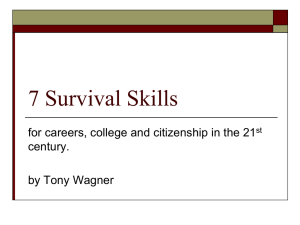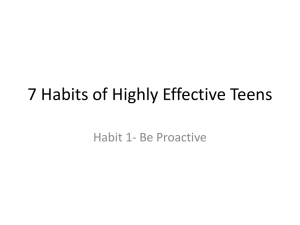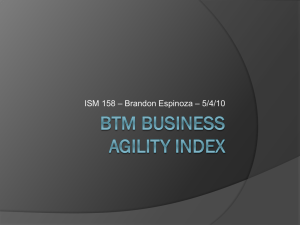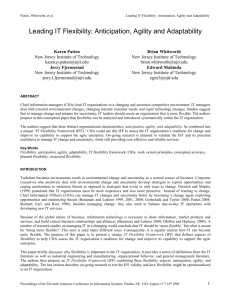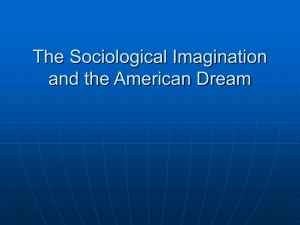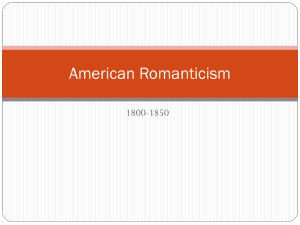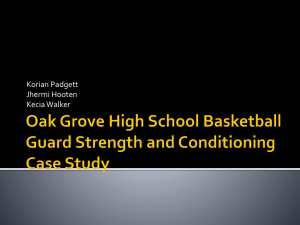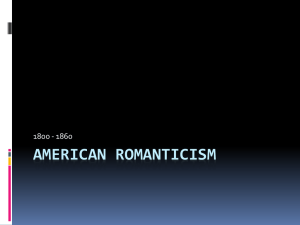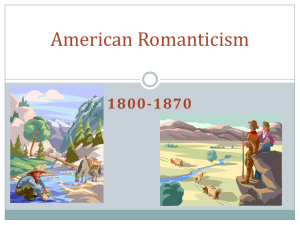Activity
advertisement
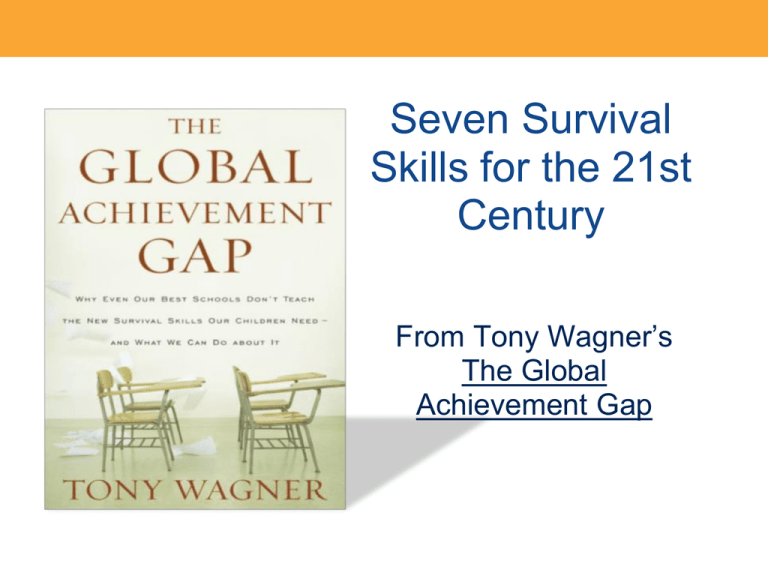
Seven Survival Skills for the 21st Century From Tony Wagner’s The Global Achievement Gap Objectives • Become familiar with the seven critical 21st century skills outlined by Tony Wagner. Tony Wagner The Seven Survival Skills for Careers, College, and Citizenship 1.Critical Thinking and Problem Solving 2.Collaboration Across Networks and Leading by Influence 3.Agility and Adaptability 4.Initiative and Entrepreneurialism 5.Effective Oral and Written Communication 6.Accessing and Analyzing Information 7.Curiosity and Imagination What’s My Skill? Activity • Each group will be assigned one of the seven critical skills to become an expert on. • Find the slides in this presentation about your assigned skill and discuss what they say. • Then look on the Internet to find more information about your skill: what it means, why it’s needed, and what it looks like in action (either in the “real world” or in schools). • Be prepared to clearly explain your skill to the whole group. Critical Thinking and Problem Solving • • • • • • Ask good questions Deal with vast amounts of information Figure out what’s important and what’s not Decide what’s accurate and what’s not Have a plan of action Do things that haven’t been done before Critical Thinking and Problem Solving "The idea that a company's senior leaders have all the answers and can solve problems by themselves has gone completely by the wayside...The person who's close to the work has to have strong analytic skills. You have to be rigorous: test your assumptions, don't take things at face value, don't go in with preconceived ideas that you're trying to prove." - Ellen Kumata, consultant to Fortune 200 companies Critical Thinking and Problem Solving “First and foremost, I look for someone who asks good questions,” Parker responded. “We can teach them the technical stuff, but we can't teach them how to ask good questions—how to think.” Clay Parker, president of the Chemical Management Division of BOC Edwards Critical Thinking and Problem Solving To compete in the new global economy, companies need their workers to think about how to continuously improve their products, processes, or services. Over and over, executives told me that the heart of critical thinking and problem solving is the ability to ask the right questions. As one senior executive from Dell said, “Yesterday's answers won't solve today's problems.” Critical Thinking and Problem Solving Ellen Kumata, managing partner at Cambria Associates, explained the extraordinary pressures on leaders today. “The challenge is this: How do you do things that haven't been done before, where you have to rethink or think anew? It's not incremental improvement any more. The markets are changing too fast.” Critical Thinking and Problem Solving: Student View Ask our students to be the ones who question-- not just the ones who answer. In the words of one student: “Miss, if you already know the answer, why do you keep asking us the question? Critical Thinking and Problem Solving Activity: 1-What types of activities would allow learners to go through the Five Step Problem Solving Strategy? http://academic.cuesta.edu/acasupp/as/407.htm 2-How can you assess critical thinking? http://www.criticalthinking.com/company/articles/assessing-critical-thinking.jsp 3-How can a lesson be structured to provide opportunities to master 21st century skills? Read the article: Infusing Teaching Thinking Into Subject-Area Instruction Visit: http://www.cloudnet.com/~edrbsass/edcreative.htm Collaboration Across Networks and Leading by Influence • Work in teams, both face-to-face and virtually • Make your own decisions • Ability to influence the people around you • Empower others to achieve results and not just complete tasks • Understand and respect differences among people • General leadership skills Collaboration Across Networks and Leading by Influence "The biggest problem we have in the company as a whole is finding people capable of exerting leadership across the board...Our mantra is that you lead by influence, rather than authority." - Mark Chandler, Senior Vice President and General Counsel at Cisco Collaboration Across Networks and Leading by Influence Teamwork is no longer just about working with others in your building. Christie Pedra, CEO of Siemens, explained, “Technology has allowed for virtual teams. We have teams working on major infrastructure projects that are all over the U.S. On other projects, you're working with people all around the world on solving a software problem. Every week they're on a variety of conference calls; they're doing Web casts; they're doing net meetings.” Collaboration Across Networks and Leading by Influence Mike Summers, vice president for Global Talent Management at Dell, said that his greatest concern was young people's lack of leadership skills. “Kids just out of school have an amazing lack of preparedness in general leadership skills and collaborative skills,” he explained. “They lack the ability to influence.” Collaboration Across Networks and Leading by Influence: Student View Collaboration Across Networks and Leading by Influence Activity: 1-What types of projects can encourage collaborating with others that are geographically in different places? Global Education On a Dime: A Low-Cost Way to Connect: http://www.edutopia.org/globaleducation-international-exchange Harris Burdick Project: http://classroombooktalk.wikispaces.com/Mysteries+of+Harris+Burdick 2-What does “The World is Flat” mean for education? http://www.edutopia.org/what-does-world-flat-mean-education 3-Name some examples of good leaders that lead by influence? What characteristics do they have in common? Internet research Agility and Adaptability • Able to work when the right answer isn’t there or when there isn’t a right answer • Adapt to constant change • Work with disruptions • Use a variety of tools (not just one) to solve new problems Agility and Adaptability Clay Parker explained that anyone who works at BOC Edwards today “has to think, be flexible, change, and use a variety of tools to solve new problems. We change what we do all the time. I can guarantee the job I hire someone to do will change or may not exist in the future, so this is why adaptability and learning skills are more important than technical skills.” Agility and Adaptability "I've been here four years, and we've done fundamental reorganization every year because of changes in the business...I can guarantee the job I hire someone to do will change or may not exist in the future, so this is why adaptability and learning skills are more important than technical skills." – Clay Parker, President of Chemical Management Division of BOC Edwards Agility and Adaptability: Student View Agility and Adaptability: Activity: 1-In a world where technologies are quickly outdated, how can schools prepare students? http://www.ted.com/talks/ken_robinson_says_schools_kill_creativity.html 2-How can schools best prepare students to succeed in the first decades of the 21st century where agility and adaptability are crucial skills for career success? Read article: Learning for the 21st Century 3-What types of activities would allow students to master these skills? Internet Research Initiative and Entrepreneurialism • Proactive, self-starters • Create your own answers and solutions • Actively look for ways to improve the systems around you • Not be afraid to try and fail • Understand that continuous success may mean you’re not reaching high enough or far enough Initiative and Entrepreneurialism "For our production and crafts staff, the hourly workers, we need self-directed people...who can find creative solutions to some very tough, challenging problems.“ - Mark Maddox, Human Resources Manager at Unilever Foods North America Initiative and Entrepreneurialism Mark Chandler, senior vice president and general counsel at Cisco, was one of the strongest proponents of initiative: “I say to my employees, if you try five things and get all five of them right, you may be failing. If you try 10 things, and get eight of them right, you're a hero. You'll never be blamed for failing to reach a stretch goal, but you will be blamed for not trying. One of the problems of a large company is risk aversion. Our challenge is how to create an entrepreneurial culture in a larger organization.” Initiative and Entrepreneurialism: Student View Initiative and Entrepreneurialism Activity: 1-What does creativity have to do with education? http://www.ted.com/talks/ken_robinson_says_schools_kill_creativity.html 2-What does “The World is Flat” mean for education? http://www.edutopia.org/what-does-world-flat-mean-education 3-What types of activities would allow students to master these skills? Internet Research Effective Oral and Written Communication • Clear and concise writing, speaking, and presenting with focus, energy, and passion • Ability to persuade others • Know how and when to use different levels of communication • Ability to provide “elevator speeches” • Presentation skills Effective Oral and Written Communication Mike Summers of Dell said, “We are routinely surprised at the difficulty some young people have in communicating: verbal skills, written skills, presentation skills. They have difficulty being clear and concise; it's hard for them to create focus, energy, and passion around the points they want to make. If you're talking to an exec, the first thing you'll get asked if you haven't made it perfectly clear in the first 60 seconds of your presentation is, ‘What do you want me to take away from this meeting?’ They don't know how to answer that question.” Effective Oral and Written Communication Summers and other leaders from various companies were not necessarily complaining about young people's poor grammar, punctuation, or spelling—the things we spend so much time teaching and testing in our schools. Although writing and speaking correctly are obviously important, the complaints I heard most frequently were about fuzzy thinking and young people not knowing how to write with a real voice. Effective Oral and Written Communication "The biggest skill people are missing is the ability to communicate: both written and oral presentations. It's a huge problem for us." - Annmarie Neal, Vice President for Talent Management at Cisco Systems Effective Oral and Written Communication: Student View Effective Oral and Written Communication Activity: 1- What does “The World is Flat” mean for education? http://www.edutopia.org/what-does-world-flat-mean-education 2-How can blogs, email, texting help learners master written communication? Internet research 3-How can a lesson be structured to provide opportunities to master 21st century skills? Read the article: Infusing Teaching Thinking Into Subject-Area Instruction Accessing and Analyzing Information • Find, evaluate, and synthesize information • Use information from a variety of sources (web pages, magazines, podcasts, TV, faceto-face interviews and discussions, videos, surveys, books, etc.) • Understand how rapidly information is changing and be able to deal with that Accessing and Analyzing Information "There is so much information available that it is almost too much, and if people aren't prepared to process the information effectively, it almost freezes them in their steps." - Mike Summers, Vice President for Global Talent Management at Dell Accessing and Analyzing Information Employees in the 21st century have to manage an astronomical amount of information daily. As Mike Summers told me, “There is so much information available that it is almost too much, and if people aren't prepared to process the information effectively it almost freezes them in their steps.” Accessing and Analyzing Information It's not only the sheer quantity of information that represents a challenge, but also how rapidly the information is changing. Quick—how many planets are there? In the early 1990s, I heard then–Harvard University president Neil Rudenstine say in a speech that the half-life of knowledge in the humanities is 10 years, and in math and science, it's only two or three years. I wonder what he would say it is today. Accessing and Analyzing Information: Student View Accessing and Analyzing Information: Student View • Watch the Bing video here. • Bing TV Commercial - The Cure for Search Overload Syndrome http://www.youtube.com/watch?v=yIxfk3hS0 uU&feature=related Accessing and Analyzing Information: Activity: 1-What important questions need to be asked about web content? Your Guide To Online Learning: http://www.econcordia.com/courses/study_skills/lesson6/061.aspx 2-How can the learner improve their research and information gathering skills? http://www.edutopia.org/personal-learning-networks-technology 3-What tools can a learner use to practice assessing and analyzing web content? Internet research Videos to watch: BING Video: http://www.youtube.com/watch?v=4w4W7fQHgYw BING Commercial: http://www.youtube.com/watch?v=yIxfk3hS0uU&feature=related BING Commercial: http://www.youtube.com/watch?v=H0f8X_SOVjA&feature=channel Curiosity and Imagination • • • • • • Ability to continually ask great questions Never be satisfied with the status quo Search for unique solutions Ask “What if…?” Dream Ability to develop unique products and services • Empathy Curiosity and Imagination "Our old idea is that work is defined by employers and that employees have to do whatever the employer wants...but actually, you would like him to come up with an interpretation that you like-he's adding something personal-a creative element." - Michael Jung, Senior Consultant at McKinsey and Company Curiosity and Imagination Mike Summers told me, “People who've learned to ask great questions and have learned to be inquisitive are the ones who move the fastest in our environment because they solve the biggest problems in ways that have the most impact on innovation.” Curiosity and Imagination Daniel Pink, the author of A Whole New Mind, observes that with increasing abundance, people want unique products and services: “For businesses it's no longer enough to create a product that's reasonably priced and adequately functional. It must also be beautiful, unique, and meaningful.”1 Pink notes that developing young people's capacities for imagination, creativity, and empathy will be increasingly important for maintaining the United States' competitive advantage in the future. Curiosity and Imagination: Student View Curiosity and Imagination: Student View • Watch the “Think Different” video here. • Apple Think Different http://www.youtube.com/watch?v=MLcYyivv 9AI Curiosity and Imagination Activity: 1-What does creativity have to do with education? http://www.ted.com/talks/ken_robinson_says_schools_kill_creativity.html 2-What value do the arts have in becoming life-long learners? Arts in Schools http://www.keepartsinschools.org/Interviews/SarahMurr.php 3-What types of activities would allow students to master these skills? Internet Research
